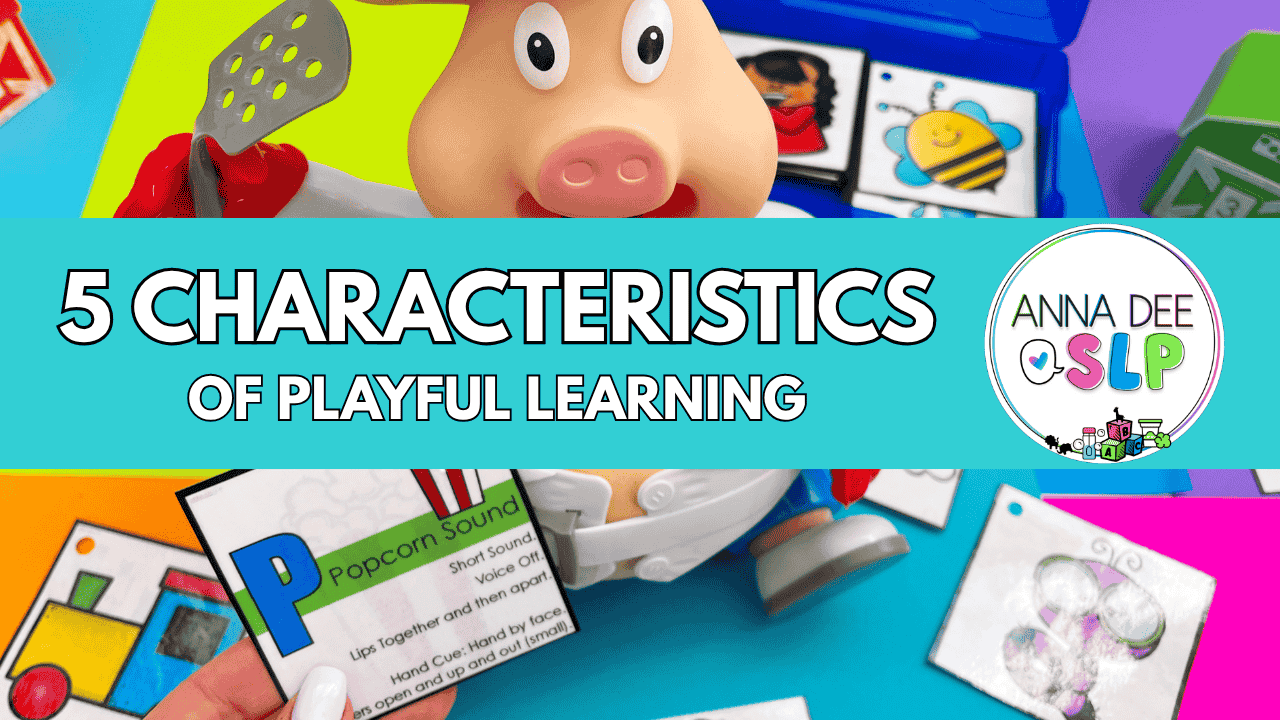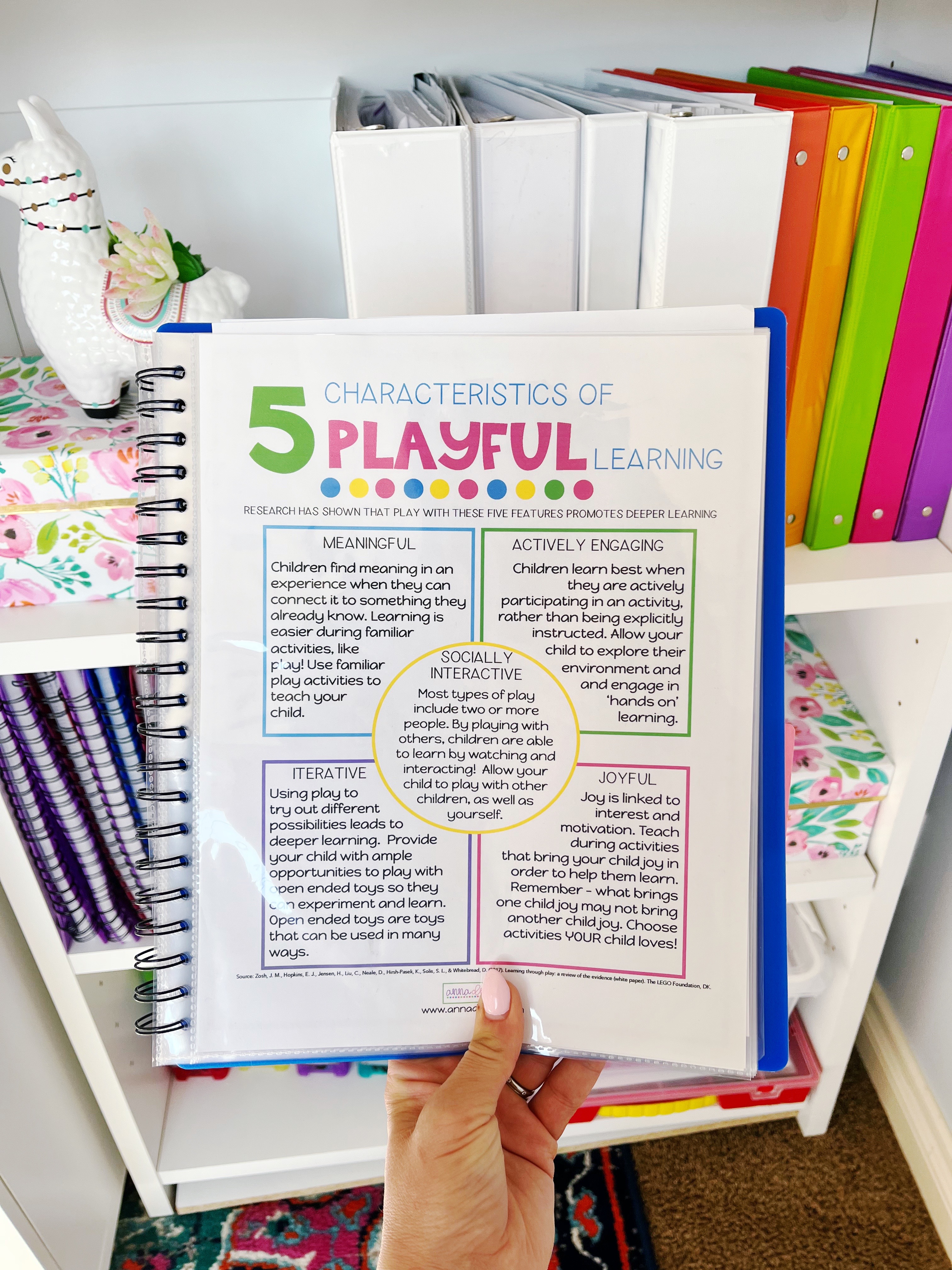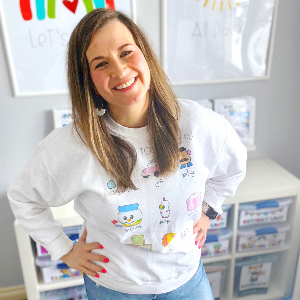Do you want to know the FIVE Characteristics of Playful Learning?

Why Play-Based Learning Matters in Preschool Speech Therapy
If you’ve ever wondered, “What type of play is best for learning?” — you’re not alone! As Speech-Language Pathologists (SLPs), educators, and parents, we know that play-based speech therapy is powerful. But research shows there are five specific characteristics of playful learning that make it truly effective for child development, language growth, and learning outcomes.
These characteristics come from the LEGO Foundation’s report Learning Through Play: A Review of the Evidence, which summarizes how children learn best through play. The good news? If you’re already using play in speech therapy, you’re likely incorporating most of these naturally.
In this post, we’ll break down each characteristic, connect it to preschool speech therapy, and give you practical tips for using it in sessions.
1. Joyful Play
Play must be fun for the child. When kids enjoy the activity, they’re more engaged and motivated to learn.
In preschool speech therapy, joy often means:
-
Following the child’s lead
-
Using their favorite toys or themes
-
Infusing laughter, silliness, and choice
For example, instead of drilling articulation cards, you might hide them inside a sensory bin or under toy animals. The task becomes a game, and suddenly learning feels less like “work.”
👉 Want more ideas? Read: Play in Speech Therapy Without Toys
2. Iterative Play
“Iterative” means children get to experiment, try, fail, and try again. These repeated cycles are how deep learning happens.
Open-ended play materials encourage this naturally:
-
Blocks for building (and rebuilding)
-
Pretend play with endless storylines
-
Sensory bins for exploring
In therapy, iterative play could look like a child stacking blocks while practicing final consonants. Each time the tower falls, they try again—practicing both speech and persistence.
3. Meaningful Play
Children learn best when new skills connect to familiar experiences. Embedding therapy goals into meaningful play helps kids link new learning with what they already know.
Examples:
-
Targeting verbs during cooking pretend play (“stir,” “pour,” “taste”)
-
Using a dollhouse to model family routines and WH-questions
-
Building narratives around a child’s real interests (dinosaurs, cars, princesses)
When therapy feels relevant, kids are more likely to remember and generalize skills outside the session.
👉 Also read: Benefits of Play in Speech Therapy
4. Socially Interactive Play
Interaction is a huge driver of learning. According to ASHA, social engagement is essential for language development.
In preschool speech therapy, socially interactive play might include:
-
Turn-taking games like rolling a ball
-
Pretend play with peers or siblings
-
Cooperative problem-solving (building together, fixing a “broken” toy)
Socially interactive play doesn’t just build language—it builds relationships, empathy, and confidence.
5. Actively Engaging Play
For play to be effective, children must be active participants, not just observers. That means hands-on, movement-based, and choice-filled experiences.
Ways to keep kids actively engaged in preschool speech therapy:
-
Role play (pretending to be a vet, firefighter, or chef)
-
Action-based games with speech targets (“jump if it starts with /s/”)
-
Interactive storytelling with puppets or props
When children are physically and mentally engaged, learning is deeper and more memorable.
Why These Characteristics Matter for Preschool Speech Therapy
These five characteristics—joyful, iterative, meaningful, socially interactive, and actively engaging—aren’t just theory. They’re research-backed strategies that align perfectly with play-based speech therapy activities.
It’s a great reminder that when we “just play,” we are actually implementing evidence-based learning strategies that support language, speech, and overall development.
Free Resource for SLPs and Parents 🎉
Want an easy way to share these concepts with families? Grab my free guide:
“It’s More Than Play — It’s Science!”
This handout explains the five characteristics of playful learning in parent-friendly language. Perfect for:
-
Sending home after sessions
-
School-to-home communication
-
Educating caregivers about the value of play
👉 Download your free guide here!
FAQs About Playful Learning in Speech Therapy
1. What is playful learning in preschool speech therapy?
Playful learning means embedding speech and language goals into fun, engaging play activities that are joyful, meaningful, and interactive.
2. What toys are best for play-based speech therapy?
Open-ended toys like blocks, dolls, pretend food, cars, and sensory bins encourage problem-solving and communication.
3. How do I explain play-based learning to parents?
Use parent-friendly language: “Play is how children learn best. We embed speech goals into fun activities so learning sticks.”
4. How do the five characteristics improve therapy outcomes?
They keep children engaged, motivated, and socially connected, which accelerates language and skill development.
5. Can parents use playful learning strategies at home?
Absolutely! Everyday activities like cooking, dressing dolls, or building forts can all support speech and language goals.
Related Reading You’ll Love
Final Thoughts + Next Step
Play isn’t just “fun and games.” With the five characteristics of playful learning, you can approach your preschool speech therapy sessions with confidence, knowing you’re using evidence-based strategies that truly work.
✨ Ready to explain the why behind play to parents and caregivers?
Download your free Playful Learning guide here and check out my other play-based therapy resources to save time and inspire joyful sessions.
Grab my free guide to the Five Characteristics of Playful Learning so you can confidently explain the “why” behind play to parents and use it in therapy tomorrow. Sign up below!
Want to learn more about Play in Speech Therapy? Check out these blogs:
Let's stay connected!
Join the mailing list to receive updates with new freebies, promos, and specials!
Don't worry, your information will not be shared.
We hate SPAM. We will never sell your information, for any reason.



